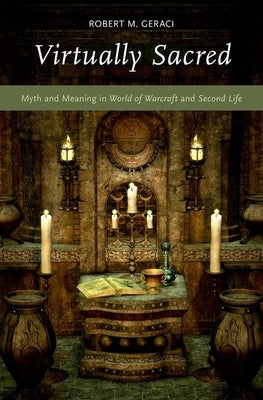1
/
of
1
Oxford University Press, USA
Virtually Sacred: Myth and Meaning in World of Warcraft and Second Life
Virtually Sacred: Myth and Meaning in World of Warcraft and Second Life
Regular price
$85.94 USD
Regular price
Sale price
$85.94 USD
Shipping calculated at checkout.
Quantity
Couldn't load pickup availability
Millions of users have taken up residence in virtual worlds, and in those worlds they find opportunities to revisit and rewrite their religious lives. Robert M. Geraci argues that virtual worlds and video games have become a locus for the satisfaction of religious needs, providing many users
with devoted communities, opportunities for ethical reflection, a meaningful experience of history and human activity, and a sense of transcendence. Using interviews, surveys, and his own first-hand experience within the virtual worlds, Geraci shows how World of Warcraft and Second Life provide
participants with the opportunity to rethink what it means to be religious in the contemporary world. Not all participants use virtual worlds for religious purposes, but many online residents use them to rearrange or replace religious practice as designers and users collaborate in the production of
a new spiritual marketplace. Using World of Warcraft and Second Life as case studies, this book shows that many residents now use virtual worlds to re-imagine their traditions and work to restore them to authentic sanctity, or else replace religious institutions with virtual communities that provide meaning and purpose to
human life. For some online residents, virtual worlds are even keys to a post-human future where technology can help us transcend mortal life. Geraci argues that World of Warcraft and Second Life are virtually sacred because they do religious work. They often do such work without regard for-and
frequently in conflict with-traditional religious institutions and practices; ultimately they participate in our sacred landscape as outsiders, competitors, and collaborators.
Author: Robert M. Geraci
Publisher: Oxford University Press, USA
Published: 07/14/2014
Pages: 368
Binding Type: Hardcover
Weight: 1.32lbs
Size: 9.30h x 6.30w x 1.30d
ISBN: 9780199344697
Review Citation(s):
Choice 01/01/2015 pg. 821
with devoted communities, opportunities for ethical reflection, a meaningful experience of history and human activity, and a sense of transcendence. Using interviews, surveys, and his own first-hand experience within the virtual worlds, Geraci shows how World of Warcraft and Second Life provide
participants with the opportunity to rethink what it means to be religious in the contemporary world. Not all participants use virtual worlds for religious purposes, but many online residents use them to rearrange or replace religious practice as designers and users collaborate in the production of
a new spiritual marketplace. Using World of Warcraft and Second Life as case studies, this book shows that many residents now use virtual worlds to re-imagine their traditions and work to restore them to authentic sanctity, or else replace religious institutions with virtual communities that provide meaning and purpose to
human life. For some online residents, virtual worlds are even keys to a post-human future where technology can help us transcend mortal life. Geraci argues that World of Warcraft and Second Life are virtually sacred because they do religious work. They often do such work without regard for-and
frequently in conflict with-traditional religious institutions and practices; ultimately they participate in our sacred landscape as outsiders, competitors, and collaborators.
Author: Robert M. Geraci
Publisher: Oxford University Press, USA
Published: 07/14/2014
Pages: 368
Binding Type: Hardcover
Weight: 1.32lbs
Size: 9.30h x 6.30w x 1.30d
ISBN: 9780199344697
Review Citation(s):
Choice 01/01/2015 pg. 821
About the Author
Robert M. Geraci is Professor in the Department of Religious Studies at Manhattan College. He is the author of Apocalyptic AI: Visions of Heaven in Robotics, Artificial Intelligence, and Virtual Reality and many essays that analyze the ways in which human beings use technology to make the world meaningful. He was the principle investigator on a National Science Foundation grant to study virtual worlds and the recipient of a Fulbright-Nehru Senior Research Award (2012-2013), which allowed him to investigate the intersections of religion and technology at the Indian Institute of Science in Bangalore.
This title is not returnable
Share


